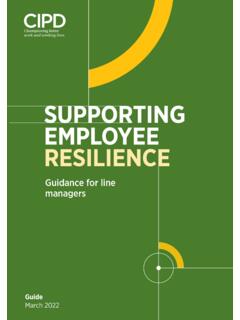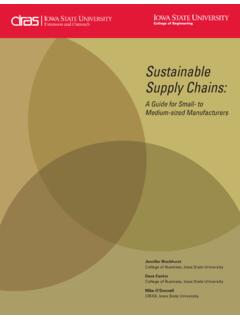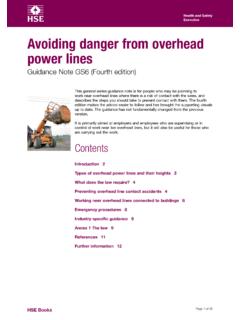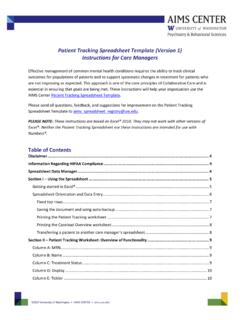Transcription of Finance for non-financial managers - Fox School of ...
1 MTD TrainingFinance for non-financialmanagersDownload free books atDownload free eBooks at MTD TrainingFinance for non-financial ManagersDownload free eBooks at Finance for non-financial Managers1st edition 2010 MTD Training & 978-87-7681-722-0 Download free eBooks at on the ad to read moreFinance for non-financial Managers4 ContentsContents Preface 71 Introduction Understanding Finance Basics Three Basic Finance Principles Basic Finance Terms Overview of the Ebook 112 Financial Information Every Organization Needs Introduction Bookkeping (Accounting) Chart of Accounts The General Journal (Original Book of Entry) The General Ledger 17 Deloitte & Touche LLP and affiliated the truth at Deloitte & Touche LLP and affiliated the truth at Deloitte & Touche LLP and affiliated the truth at Deloitte & Touche LLP and affiliated the truth at Download free eBooks at on the ad to read moreFinance for non-financial Managers5 Contents3 Balance Sheet Introduction What a Balance Sheet Tells You What the Balance Sheet Doesn t Tell You 224 The Income Statement Introduction Elements of the Income Statement What an Income Statement Tells You What an Income Statement Does Not Tell You 275 Cash Flow Statement Introduction Cash Flow Categories Preparing the Cash Flow Statement 306 Understanding Budgets Introduction Approaches to Budgeting
2 Reading the Budget 35 TMP PRODUCTIONNY026057 BPSTANKIEgl/rv/rv/bafACCCTR0005 Bookboon Ad Creative46 x 412/13/2013 Bring your talent and passion to aglobal organization at the forefront ofbusiness, technology and how great you can be. Visit 2013 Accenture. All rights free eBooks at on the ad to read moreFinance for non-financial Managers6 Contents7 Pricing Introduction How Important is Price? Demand for the Product or Service Your Environment Pricing Strategies 378 Applying Your Knowledge Introduction Defining Your Reasons Background Objectives Scope of Operations Operational Constraints Understanding Risk 459 References 48 . Download free eBooks at for non-financial Managers7 PrefacePrefaceToday s managers need to be more commercially aware more so than ever before.
3 Even if they do not have to manage budgets or finances themselves as part of their role they still need to understand about the financials of a company, what it all means and the impact of their actions on the bottom this textbook you ll receive a thorough grounding that explains what all of the financial statements of a company means from a non Finance point of view. Explained in easy to understand language, you will soon gain a great insight into the Finance aspects of a company even if you have no direct input into the financials McPheat, the Founder and Managing Director of management development specialists, MTD Training is the author of this publication. Sean has been featured on CNN, BBC, ITV, on numerous radio stations and has contributed to many newspapers.
4 He s been featured in over 250 different publications as a thought leader within the management development and training has been working with a wide variety of clients (both large and small) in the UK and internationally for several specialise in providing: t In-house, tailor made management training courses (1 5 days duration) t Open courses (Delivered throughout the UK at various locations) t Management & leadership development programmes (From 5 days to 2 years) t Corporate and executive coaching (With senior or middle managers ) MTD provide a wide range of management training courses and programmes that enable new and experienced managers to maximise their potential by gaining or refining their management and leadership skills. Download free eBooks at for non-financial Managers8 PrefaceContact MTD:Online:Web: Email: The UK: 0800 849 6732 International: ++ 44 2476 233 151 Download free eBooks at for non-financial Managers9 Introduction1 Introduction Understanding Finance BasicsPeople can spend a lifetime studying the principles of Finance in the business world.
5 The financial situation of an organization is impacted by every decision made and every action taken. In fact, you could argue that everything a business every does is actually somehow a financial activity. For example, you lose a customer and it impacts revenue. You spend money on a marketing campaign that has a huge return and you ve made a positive financial investment. If you don t keep your team members on task, you re effectively wasting company resources. You could argue that everything a business does is actually somehow a financial managers in an organization can still benefit from understanding Finance because they will then be aware of how their decisions impact the overall financial health of the organization. They can become more conscientious about their decision making and their operations in order to help the organization s bottom line .
6 If you are a small business or an independent entrepreneur, understanding the basic principles of Finance could mean the difference between your business surviving and thriving or failing. You need to understand how to read a budget, create a budget, and to invest your resources to get the maximum benefit that you can. Three Basic Finance Principles If you want to be financially aware, even as a non- Finance manager , you have to be able to look at your actions and the actions of your team in terms of basic financial principles. You don t have to assign a dollar value to every activity, but you should think in large terms about how your decisions will impact the financial well-being of the business. Remember too that there are both direct and indirect impacts on the organization s finances.
7 For example, you might deny a customer a credit on their bill that they feel they deserve because you are saving money for the organization. But if that customer leaves your organization for the competition, you have indirectly impacted the company s finances in a negative manner because you have lost the future revenue that the customer would have provided. You don t have to assign a dollar value to every activity you undertake, but you should think in large terms about how your decisions will impact the financial well-being of the free eBooks at on the ad to read moreFinance for non-financial Managers10 IntroductionThere are three basic principles that form the framework for all corporate Finance : t The Investment Principle Every business invests assets and incurs debts of some sort, even if the debt is in the form of equity owned by the owner or a partner.
8 T The Financing PrincipleBusinesses can Finance their operations with a mixture of tools that include investments in assets or borrowing money such as through loans or bonds. Or, they could sell stock if they are publicly traded. This mixture can depend on several things such as legal issues, the business willingness to take on risk, and the capital available versus the capital needed. t The Dividend Principle A successful business will eventually need to return some money to its investors. This could be the owner taking some cash out of the till or it could be in the form of stock dividends. Again, it depends on many characteristics of the business such as legal form and requirements, size, and what those receiving the dividends prefer. In essence, the way an organization manages its finances is guided by these three principles.
9 However, the way in which the principles are applied will vary greatly from organization to organization. !"#$%#&'()$*+$#,*-+.'#)%/0$12.')#$3*4#.$ 2)%$3.*35/&'*)$&*/56'*)&$'&$,.5,'2/$+*.$ 789$:'# The Wakethe only emission we want to leave behindDownload free eBooks at for non-financial Managers11 Basic Finance TermsFinance has its own lingo. In order to help you understand what is explained in the rest of the ebook, you should have some basic terms under your belt. Figure 1 lists some of the most commonly used terms in corporate Finance . AssetsItems owned by the business (see Capital Assets, Current Assets and Fixed Assets)BondsCertificates of debt which are issued by an organization in order to raise funding. The bond holder earns a fixed rate of interest (usually) and the bond must be repaid by a specific Assets available to be invested with the intention of creating new assets.
10 Capital AssetsTangible property that is not easily converted into cash. Capital assets are usually held long-term and include things like buildings, equipment, and other owned items. Capital Budget The plan a company has to Finance existing or new capital assets. Organizations usually have a capital budget and an operating budget. (See operating budget). Current Assets The company s total of cash, accounts receivable, and other assets that could be converted into cash within a year. This is the money usually used for day-to-day operations. Debt Financing Creating capital by incurring debt such as by selling bonds or notes. Equity 1) The total of a company s assets minus its liabilities 2) Ownership interest in a corporation in the form of stockExpensesAny cost of operating the business Fixed AssetsLong-term, tangible assets that are used by the business tnd that the organization does not plan to convert to cash in the current or next fiscal year.




